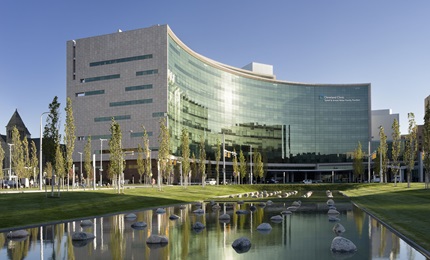Neal Peachey, PhD
- Call 216.445.1942
Insurance
Is Cleveland Clinic Part of Your Insurance?
Review a list of accepted insurance plans for our Northeast Ohio locations or learn more about purchasing a contracted managed care plan.
View All PlansAbout Neal Peachey, PhD
Neal Peachey, PhD, is a Staff Member in the Department of Ophthalmic Research and the Cole Eye Institute. His specialty interest is hereditary retinal disease. Dr. Peachey is also Professor of Molecular Medicine at Case Western Reserve University in Cleveland, Oh.
Dr. Peachey completed post-doctoral studies at the University of Illinois, Chicago in Ophthalmology.
He has published a number of articles in peer-reviewed journals such as, Advances in Space Research, Journal of Comparative Neurology, Investigative Ophthalmology & Visual Science, Visual Neuroscience, and Journal of Biological Chemistry, to name a few.
Education & Professional Highlights
Appointed
2000
Education & Fellowships
Graduate School - Northeastern University
Boston,
MA
1985
Graduate School - Northeastern University
Boston,
MA
1982
Undergraduate - Hobart College
Geneva,
NY
1978
Fellowship - University of Illinois at Chicago
Postdoctoral
Chicago,
IL
Specialty Interests
hereditary retinal disease
Research & Publications
See publications for Neal Peachey, PhD.
(Disclaimer: This search is powered by PubMed, a service of the U.S. National Library of Medicine. PubMed is a third-party website with no affiliation with Cleveland Clinic.)
Industry Relationships
Cleveland Clinic physicians and scientists may collaborate with the pharmaceutical or medical device industries to help develop medical breakthroughs or provide medical expertise or education. Cleveland Clinic strives to make scientific advances that will benefit patient care and support outside relationships that promise public benefit. In order for the discoveries of Cleveland Clinic physicians' and scientists' laboratories and investigations to benefit the public, these discoveries must be commercialized in partnership with industry. As experts in their fields, Cleveland Clinic physicians and scientists are often sought after by industry to consult, provide expertise and education.
To assure professional and commercial integrity in such matters, Cleveland Clinic maintains a program that reviews these collaborations and, when appropriate, puts measures in place to minimize bias that may result from ties to industry. Cleveland Clinic publicly discloses the names of companies when (i) its physicians/scientists receive $5,000 or more per year (or, in rare cases, equity or stock options) for speaking and consulting, (ii) its physicians/scientists serve as a fiduciary, (iii) its physicians/scientists receive or have the right to receive royalties or (iv) its physicians/ scientists hold any equity interest for the physician's/scientist's role as inventor, discoverer, developer, founder or consultant.* In publicly disclosing this information, Cleveland Clinic tries to provide information as accurately as possible about its physicians' and scientists' connections with industry.
As of 1/30/2025, Dr. Peachey has reported no financial relationship with industry that is applicable to this listing. In general, patients should feel free to contact their doctor about any of the relationships and how the relationships are overseen by Cleveland Clinic. To learn more about Cleveland Clinic's policies on collaborations with industry and innovation management, go to our Integrity in Innovation page.
Public Health Service-Reportable Financial Conflicts of Interest. Cleveland Clinic scientists and physicians engage in basic, translational and clinical research activities, working to solve health problems, enhance patient care and improve quality of life for patients. Interactions with industry are essential to bringing the researchers' discoveries to the public, but can present the potential for conflicts of interest related to their research activities. Click here to view a listing of instances where Cleveland Clinic has identified a Public Health Service (PHS)-Reportable Financial Conflict of Interest and has put measures in place to ensure that, to the extent possible, the design, conduct and reporting of the research is free from bias.
* Cleveland Clinic physicians and scientists subscribe to the guidance presented in the PhRMA Code on Interactions with Healthcare Professionals and the AdvaMed Code of Ethics on Interactions with Health Care Professionals. As such, gifts of substantial value are generally prohibited.
